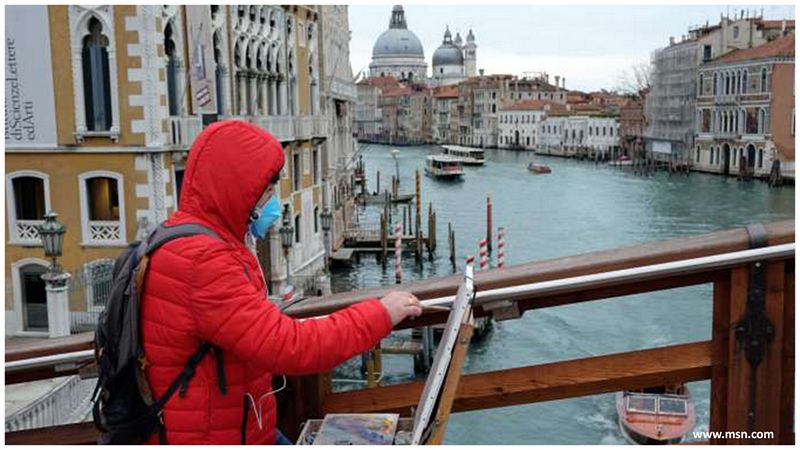Italians will be allowed to walk and visit family members without precedent for nine weeks on Monday as Europe's hardest-hit nation moves back the world's longest across the nation coronavirus lockdown.
4,000,000 individuals - an expected 72 percent of the men - will come back to their building destinations and plants as the financially and sincerely broke nation attempts to return to work.
Cafés that have figured out how to endure Italy's most deplorable emergency in ages will revive for takeaway administration.
Yet, bars and even frozen yogurt parlors will stay shut. The utilization of open vehicles will be disheartened and everybody should wear covers in indoor open spaces.
"We are feeling a blend of bliss and dread," 40-year-old Stefano Milano said in Rome.
There will be extraordinary bliss in having the option to go running again lighthearted, in my child being permitted to have his little cousin over to victory his birthday candles, to see our folks," the dad-of-three said.
"In any case, we are likewise anxious because they are old and my dad-in-law has malignancy so is a high hazard".
'Snapshot of duty'
Wuhan, the Chinese city where the infection developed in December, drove the world with a phenomenal lockdown on January 23 that kept going 76 days.
Weeks after the fact Italy stuck to this same pattern, turning into the primary Western popular government to close down everything despite an ailment that has now authoritatively murdered 28,884 - the most in Europe - and some dread thousands more.
The lives of Italians started surrounding them as it turned out to be progressively clear that the first bunch of diseases in quite a while around Milan were spiraling wild.
Leader Giuseppe Conte started by placing a fourth of the populace in the northern mechanical heartland on lockdown on March 8.
The abrupt measure alarmed many - dreadful of being secured together with the social affair danger - into escaping to less influenced areas further south.
The threat of the infection spreading with them and crippling the south's less evolved medicinal services framework constrained Conte to report an across the nation lockdown on March 9.
"Today is our snapshot of obligation," Conte told the country. "We can't allow our gatekeeper to down."
The official loss of life was then 724.
More floods of limitations followed as hundreds started kicking the bucket every day.
Nearly everything aside from drug stores and markets was covered over the Mediterranean nation of 60 million on March 12.
Conte's last move of the bones included shutting all trivial production lines on March 22.
Italy's most noteworthy single cost - 969 - was accounted for five days after the fact.
'Stressed over reviving'
The monetary cost of every one of those shutdowns has been memorable.
Italy's economy - the eurozone's third-biggest a year ago - is relied upon to recoil more than at whatever year since the worldwide misery of the 1930s.
Half of the workforce is getting state support and a similar number told a top surveyor that they feared to get jobless.
What's more, a portion of the individuals who are out of a vocation as of now state they don't completely trust in Conte's capacity to securely explore the country out of risk.
"I am stressed over the reviving. The specialists appear to be uncertain about how to continue," 37-year-old Davide Napoleoni told AFP.
Conte's prevalence has hopped alongside that of the greater part of other world pioneers thinking about the pandemic gratitude to a meeting around the banner impact.
In any case, a Demos survey led toward the finish of April discovered a portion of Conte's shine blurring.
Trust in his administration has sneaked past eight rate focuses on a still-solid 63 percent since March.
Mental cost
Italy's stunned reviving is confused by a profoundly decentralized framework that permits the nation's 20 locales to layer on their guidelines.
Venice's Veneto and the southern Calabria districts have accordingly been serving nourishment and drink at bars and eateries with open-air seating since a week ago.
The region around Genoa is considering permitting little gatherings of individuals to go cruising and reviving its seashores.
Neighboring Emilia-Romagna is keeping them shut - even to the individuals who live by the ocean.
This vulnerability gives off the impression of being burdening the country's mind.
A survey by the Piepoli Institute indicated 62 percent of Italians figure they will require mental help with grasping the post-lockdown world.
"The evening of the infection proceeds," humanist Ilvo Diamanti wrote in La Repubblica every day.
"Also, you can barely observe the light not too far off. On the off chance that anything, we're becoming accustomed to moving in obscurity."

 Four million people -- an estimated 72 percent of the men -- will return to their construction sites and factories as the economically and emotionally shattered country tries to get back to work
Four million people -- an estimated 72 percent of the men -- will return to their construction sites and factories as the economically and emotionally shattered country tries to get back to work









.jpeg)

.jpeg)
.jpeg)

.jpeg)


.jpeg)



.jpeg)
.jpeg)
.jpeg)


.jpg)


.jpeg)
.jpeg)